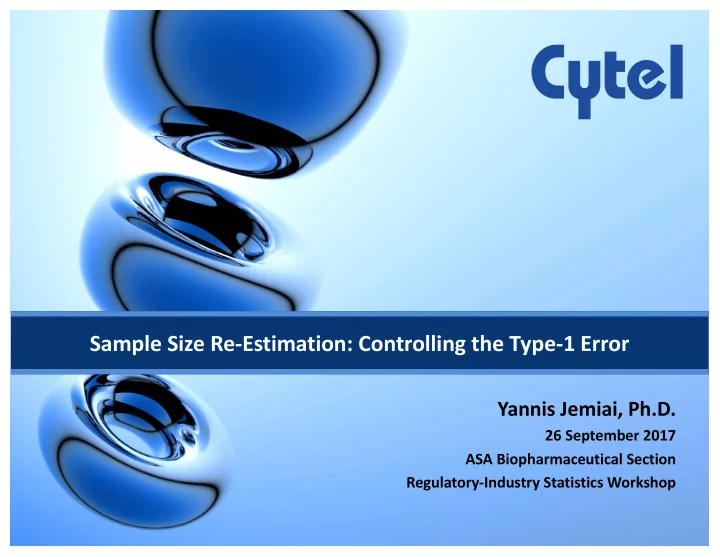

Sample Size Re-Estimation: Controlling the Type-1 Error Yannis Jemiai, Ph.D. 26 September 2017 ASA Biopharmaceutical Section Regulatory-Industry Statistics Workshop
unblinded sample size re-estimation is an essential design tool Addresses uncertainty in trial design assumptions One of the most popular adaptations, especially when using a Promising Zone approach 21 st Century Cures Act, PDUFA VI, encourage the use of adaptive designs Regulatory guidance documents exist from EMA (2007), FDA CDER / CBER (2010), and CDRH (2016) Increasingly many examples of regulatory acceptance Y Jemiai – 26 Sep 2017 Regulatory-Industry Statistics 2
So what are some of the issues concerning uSSR designs? Can type-1 error be controlled? Can sound adaptive decision rules be developed? How do we get a point estimate and confidence intervals for the treatment effect? How do we avoid operational bias during trial conduct? We focus here on type-1 error control Y Jemiai – 26 Sep 2017 Regulatory-Industry Statistics 3
Why does type-1 error get inflated? Consider a two-stage design without sample size increase Suppose now that we increase the sample size in stage II from n (2) to n *(2) , but we do not change the critical value This will lead to type-1 error inflation Y Jemiai – 26 Sep 2017 Regulatory-Industry Statistics 4
How can we control type-1 error then? Y Jemiai – 26 Sep 2017 Regulatory-Industry Statistics 5
Chronology of development (partial list) Y Jemiai – 26 Sep 2017 Regulatory-Industry Statistics 6
1. Use a weighted statistic with pre-specified weights Y Jemiai – 26 Sep 2017 Regulatory-Industry Statistics 7
Also called the p-value combination approach Y Jemiai – 26 Sep 2017 Regulatory-Industry Statistics 8
2. Use the Conventional Wald Statistic Y Jemiai – 26 Sep 2017 Regulatory-Industry Statistics 9
Extended CDL Method Y Jemiai – 26 Sep 2017 Regulatory-Industry Statistics 10
Why does it work? Y Jemiai – 26 Sep 2017 Regulatory-Industry Statistics 11
… and what are the concerns? Y Jemiai – 26 Sep 2017 Regulatory-Industry Statistics 12
3. Preserve Conditional type-1 error rate Y Jemiai – 26 Sep 2017 Regulatory-Industry Statistics 13
Preserving the overall type-1 error rate Y Jemiai – 26 Sep 2017 Regulatory-Industry Statistics 14
Conditional type-1 error rate Y Jemiai – 26 Sep 2017 Regulatory-Industry Statistics 15
Conditional type-1 error rate Y Jemiai – 26 Sep 2017 Regulatory-Industry Statistics 16
Conditional type-1 error rate Y Jemiai – 26 Sep 2017 Regulatory-Industry Statistics 17
Conditional type-1 error rate Y Jemiai – 26 Sep 2017 Regulatory-Industry Statistics 18
Conditional type-1 error rate Y Jemiai – 26 Sep 2017 Regulatory-Industry Statistics 19
Points to consider Handling survival endpoints Usable information at interim analysis Non-inferiority & equivalence settings Independent increments Small samples Y Jemiai – 26 Sep 2017 Regulatory-Industry Statistics 20
Recap: challenges in unblinded SSR trials Type-1 error control is not an obstacle. Methods exist to ensure strong control Inference remains a challenge, but making some progress Decision-making algorithm can be optimized using simulations and latest research Operational bias can be addressed/minimized by using iDMCs, putting in place proper processes, and making use of technology Y Jemiai – 26 Sep 2017 Regulatory-Industry Statistics 21
“By failing to prepare, you are preparing to fail.” - Benjamin Franklin Y Jemiai – 26 Sep 2017 Regulatory-Industry Statistics 22 22
Thank you Y Jemiai – 26 Sep 2017 Regulatory-Industry Statistics 23
Recommend
More recommend